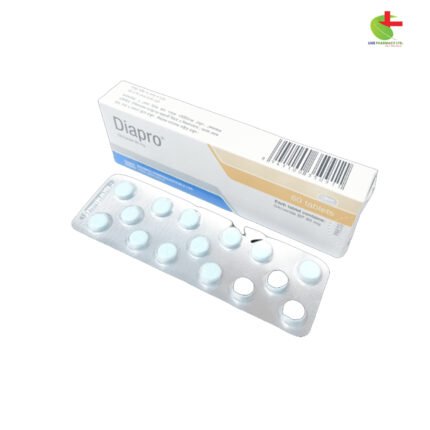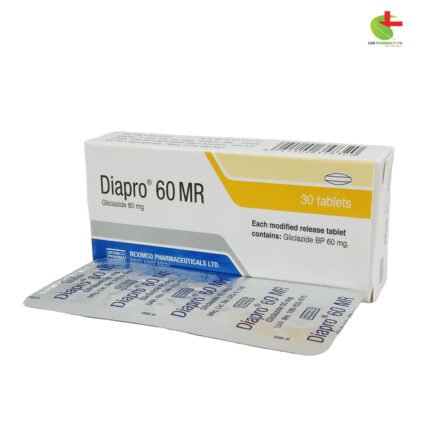Diapro MR 30
70.00৳ Strip
- Diapro manages type 2 diabetes when diet and exercise are insufficient.
- Contains gliclazide, which lowers blood sugar by stimulating insulin release and reducing liver glucose production.
- Available in film-coated and modified-release tablets; dosage should be tailored by a healthcare provider.
- Adhere to prescribed diet and exercise; consult your doctor about interactions and side effects.
 Brand
Brand
|
Beximco Pharmaceuticals Ltd |
|---|---|
 Generics
Generics
|
Gliclazide |
 Type
Type
|
Tablet |
Indications
Diapro MR is an oral medication designed to lower blood sugar levels, specifically for managing type 2 diabetes mellitus in adults. It belongs to the sulfonylurea class of drugs and is prescribed when lifestyle changes such as diet, exercise, and weight management alone are insufficient to control blood glucose levels effectively.
Pharmacology
Diapro’s active ingredient, gliclazide, is a second-generation sulfonylurea with both hypoglycemic and potential hematological benefits. It works by stimulating insulin release from pancreatic beta cells through enhanced calcium ion transport and reducing glucose production in the liver.
Dosage & Administration
Film-Coated Tablets:
- Initial Dose: 40 to 80 mg daily, typically increased to a maximum of 320 mg daily if necessary.
- Administration: Take the tablets before meals. Gliclazide is not recommended for children or those with juvenile diabetes.
Modified Release Tablets:
- Recommended Dose: One to four tablets (up to 120 mg) taken once daily with breakfast, depending on treatment response.
- Instructions: Swallow tablets whole with a glass of water at breakfast. Do not chew or crush the tablets. Always follow your doctor’s advice regarding dosage adjustments based on blood sugar levels and other factors.
Combination Therapy:
- When used with other diabetes medications, the appropriate dosage will be determined by your doctor. Contact your healthcare provider if blood sugar levels remain high despite adherence to the prescribed regimen.
Missed Dose: If you miss a dose, take the next dose at the scheduled time. Do not double up on doses.
Stopping Treatment: Consult your doctor before discontinuing Diapro, as abrupt cessation could lead to elevated blood sugar levels and potential complications.
Interactions
Diapro’s effectiveness can be influenced by other medications. It may enhance the blood sugar-lowering effects of certain drugs, including:
- Other antidiabetic agents, antibiotics (e.g., sulphonamides, clarithromycin), antihypertensives (e.g., beta-blockers, ACE inhibitors), antifungals (e.g., miconazole), and medications for ulcers and depression.
Conversely, Diapro’s effectiveness might be reduced by:
- Central nervous system disorders medications (e.g., chlorpromazine), anti-inflammatory drugs (e.g., corticosteroids), and others such as St. John’s Wort.
Alcohol: Avoid alcohol as it can unpredictably affect blood glucose control.
Driving and Machinery
Low or high blood sugar levels can impair concentration and reaction times. If you experience frequent episodes of hypoglycemia or other symptoms affecting your alertness, consult your doctor regarding your ability to drive or operate machinery.
Side Effects
Common side effects include:
- Hypoglycemia: Symptoms may include headache, intense hunger, nausea, and confusion. Severe cases require immediate medical attention.
- Liver Disorders: Look for signs of jaundice. Consult your doctor if these occur.
- Skin Reactions: Includes rash, itching, and swelling. Discontinue use and seek medical advice if severe reactions occur.
- Blood Disorders: Symptoms like pallor and bruising may appear. These typically resolve after stopping the medication.
- Digestive Issues: May include abdominal pain, nausea, and diarrhea. Taking Diapro with meals can reduce these effects.
- Eye Disorders: Temporary vision changes may occur, especially during the initial treatment phase.
Pregnancy & Lactation
Diapro is not recommended during pregnancy or breastfeeding. Consult your doctor for alternative treatment options if you are pregnant, planning to become pregnant, or breastfeeding.
Precautions & Warnings
Ensure you follow the prescribed treatment plan, including dietary and lifestyle modifications. Regular monitoring of blood sugar levels and HbA1c is crucial. Be cautious of hypoglycemia, especially under conditions like fasting, increased physical activity, or medication interactions.
If you have a family history of glucose-6-phosphate dehydrogenase (G6PD) deficiency, consult your doctor before starting Diapro.
Storage
Store Diapro out of reach of children, below 30°C, and away from direct sunlight. Do not use past the expiry date. Dispose of unused medicines responsibly to protect the environment.
For further details or questions, please consult your healthcare provider or pharmacist.













Reviews
There are no reviews yet.